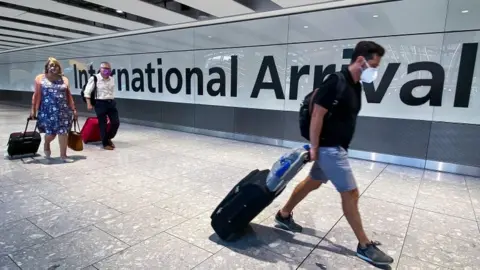Political parties want to appear tough on immigration but numbers tell different story
 PA Media
PA MediaIn recent days, the prime minister has said immigration should fall.
The Labour leader Sir Keir Starmer has said the UK's "immigration dependency", as he put it, must end.
Even if, in an interview I did with him, he wasn't willing to explicitly say he wanted the numbers to fall.
And then there are these latest figures. Half a million more people arriving in the UK than leaving in the year to June. Half a million. The highest ever.
Take a step back from the political argument here, and this is an outwardly flattering scenario. A country whose magnetism to so many propels people to our shores in such numbers.
Whatever their circumstances or background, half a million more people concluding their hopes and dreams are better served by moving to the UK than by leaving.
And yet, as so often with the question of immigration, it creates a cascade of political and societal quandaries.
Opinion polls suggest concerns about immigration eased after the Brexit referendum, but it remains a significant worry for many.
Not on the scale of the cost of living, the economy or the health service. But important nonetheless.
And none of these issues exist in isolation.
Migration has an impact on these issues too.
It's worth remembering, by the way, that not all political leaders express a desire for the numbers to shrivel. Take the Scottish National Party, for instance, which advocates more immigration.
But for those that do talk about, or at least hint at reducing the numbers, actually delivering that requires difficult decisions. Should fewer international students be allowed in? What about fewer people coming to the UK to work in the NHS? And at what consequence?
But what too could be the consequence of political rhetoric and observable reality being so out of step, as a swelling population heaps further pressure on school places, the health service and housing?
Almost instantly, the former Brexit Party leader Nigel Farage branded it a disgrace, and said that Reform UK, the successor to the Brexit Party, would field candidates everywhere at the next general election.
Let's see.
One recent opinion poll from Deltapoll does suggest that among Conservative-leaning, Leave-backing voters, asylum and immigration is hugely, hugely important.
So how do those voters, many of whom perhaps backed Leave expecting immigration to fall, respond?
Who do they blame? And where do they turn? And what do the Conservatives and Labour say now?
Home Secretary Suella Braverman said "we remain committed to reducing migration over time, in line with our manifesto commitment".
You may remember the Conservatives long promised to reduce net migration to the tens of thousands, and it never happened.
Labour said there had been Conservative "mismanagement" of the asylum and immigration systems. But they themselves have shifted their frontbench view a million miles from where it was. They want to appear robust on immigration.
But can both big parties at Westminster continue saying this stuff with any credibility if the numbers tell a different story?
